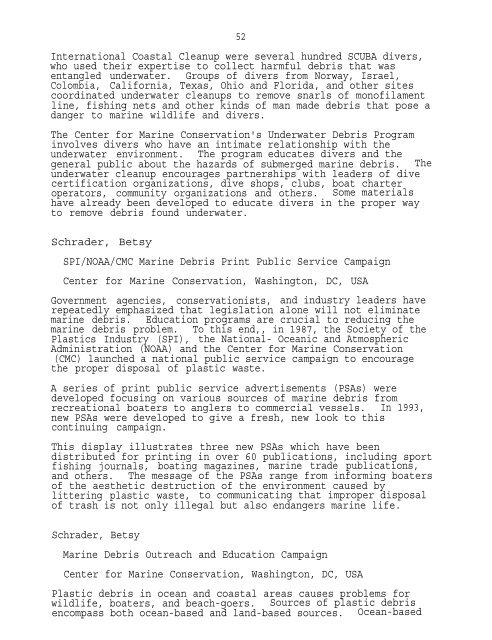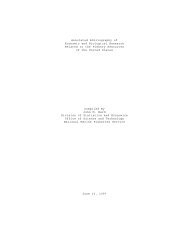Poster abstracts and manuscripts from the Third International ...
Poster abstracts and manuscripts from the Third International ...
Poster abstracts and manuscripts from the Third International ...
Create successful ePaper yourself
Turn your PDF publications into a flip-book with our unique Google optimized e-Paper software.
52<br />
<strong>International</strong> Coastal Cleanup were several hundred SCUBA divers,<br />
who used <strong>the</strong>ir expertise to collect harmful debris that was<br />
entangled underwater. Groups of divers <strong>from</strong> Norway, Israel,<br />
Colombia, California, Texas, Ohio <strong>and</strong> Florida, <strong>and</strong> o<strong>the</strong>r sites<br />
coordinated underwater cleanups to remove snarls of monofilament<br />
line, fishing nets <strong>and</strong> o<strong>the</strong>r kinds of man made debris that pose a<br />
danger to marine wildlife <strong>and</strong> divers.<br />
The Center for Marine Conservation's Underwater Debris Program<br />
involves divers who have an intimate relationship with <strong>the</strong><br />
underwater environment. The program educates divers <strong>and</strong> <strong>the</strong><br />
general public about <strong>the</strong> hazards of submerged marine debris. The<br />
underwater cleanup encourages partnerships with leaders of dive<br />
certification organizations, dive shops, clubs, boat charter<br />
operators, community organizations <strong>and</strong> o<strong>the</strong>rs. Some materials<br />
have already been developed to educate divers in <strong>the</strong> proper way<br />
to remove debris found underwater.<br />
Schrader, Betsy<br />
SPI/NOAA/CMC Marine Debris Print Public Service Campaign<br />
Center for Marine Conservation, Washington, DC, USA<br />
Government agencies, conservationists, <strong>and</strong> industry leaders have<br />
repeatedly emphasized that legislation alone will not eliminate<br />
marine debris. Education programs are crucial to reducing <strong>the</strong><br />
marine debris problem. To this end,, in 1987, <strong>the</strong> Society of <strong>the</strong><br />
Plastics Industry (SPI), <strong>the</strong> National- Oceanic <strong>and</strong> Atmospheric<br />
Administration (NOAA) <strong>and</strong> <strong>the</strong> Center for Marine Conservation<br />
(CMC) launched a national public service campaign to encourage<br />
<strong>the</strong> proper disposal of plastic waste.<br />
A series of print public service advertisements (PSAs) were<br />
developed focusing on various sources of marine debris <strong>from</strong><br />
recreational boaters to anglers to commercial vessels. In 1993,<br />
new PSAs were developed to give a fresh, new look to this<br />
continuing campaign.<br />
This display illustrates three new PSAs which have been<br />
distributed for printing in over 60 publications, including sport<br />
fishing journals, boating magazines, marine trade publications,<br />
<strong>and</strong> o<strong>the</strong>rs. The message of <strong>the</strong> PSAs range <strong>from</strong> informing boaters<br />
of <strong>the</strong> aes<strong>the</strong>tic destruction of <strong>the</strong> environment caused by<br />
littering plastic waste, to communicating that improper disposal<br />
of trash is not only illegal but also endangers marine life.<br />
Schrader, Betsy<br />
Marine Debris Outreach <strong>and</strong> Education Campaign<br />
Center for Marine Conservation, Washington, DC, USA<br />
Plastic debris in ocean <strong>and</strong> coastal areas causes problems for<br />
wildlife, boaters, <strong>and</strong> beach-goers. Sources of plastic debris<br />
encompass both ocean-based <strong>and</strong> l<strong>and</strong>-based sources. Ocean-based
















